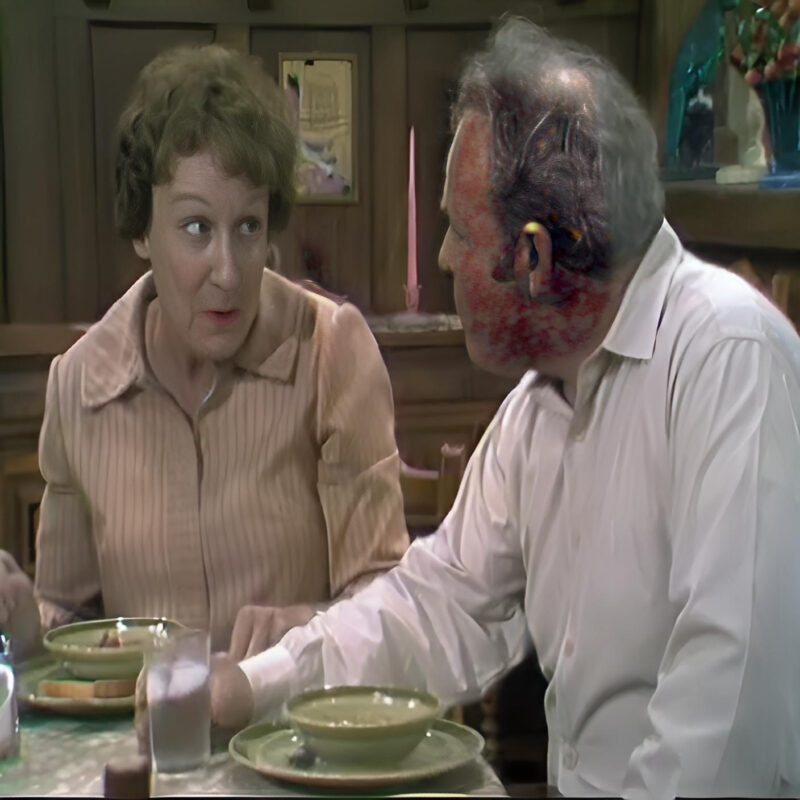
It takes a truly intelligent actor to convincingly portray a beloved dingbat. Many actors can and do play characters perceived as foolish, but Jean Stapleton, who passed away this weekend at the age of 90, was a rare exception. She was a thoughtful, intelligent, Broadway-trained actor who used her considerable skill and charisma to create one of television’s most beloved icons: Edith Bunker from “All in the Family.”
Few characters in television history are as indelible as Edith, and few performances are more fondly remembered. To recall “All in the Family” — the groundbreaking hit that aired on CBS from 1971 to 1979 — is to see Stapleton vividly in one’s mind. There she is, doing her endearingly comic run/shuffle to the kitchen to get her husband, Archie, a beer; calling his name in that distinctive, high-pitched, nasal tone that was somehow never grating; fearfully shooing people away from his chair; flashing apologetic glances when he said something rude and stupid; and, for reasons not always clear but crucial to the show’s success, smiling at Archie with complete joy and unconditional love.
There were no weak links in “All in the Family”: Norman Lear’s guiding hand, Carroll O’Connor’s star turn, and the supporting work of Rob Reiner and Sally Struthers all combined to make the show the critically acclaimed smash it became. Yet, there is something about Stapleton’s performance that seems essential to the show’s success — one reason why the Edith-less sequel, “Archie Bunker’s Place,” is now largely forgotten.
If Archie’s bigotry and anger drove the show, Edith’s warmth kept it from running off the road. Her affection for Archie allowed viewers to find something lovable, or at least redeemable, in him. Her strength made it clear that her compliance — the willingness to let Archie call her a dingbat and tell her to stifle — was built on love, not fear. Edith could only be pushed so far: she was naive and sweet, but she wasn’t stupid or weak, and she wouldn’t tolerate anything that threatened her family.
For further proof of Stapleton’s talent, consider the challenging scenes the writers entrusted to her. Some of the show’s most memorable episodes relied on her stage-honed dramatic gifts. She skillfully took Edith through menopause, a cancer scare, and a harrowing encounter with a would-be rapist — storylines that no network sitcom today would dare handle.
Stapleton also knew when it was time to move on. By 1978, “All in the Family” was changing: Reiner and Struthers were leaving, a new child was being added (almost always a kiss of death for TV shows), and the series was transitioning into “Archie Bunker’s Place.” Stapleton could have clung to a high-paying job that had already earned her eight Emmy nominations and three wins, but she was ready to leave and did so with no apparent regrets.
We shouldn’t have any regrets either. While we can’t see most of her stage work, we can still enjoy her performances in “Bells Are Ringing” and “Damn Yankees.” Her portrayal of Eleanor Roosevelt in “Eleanor: First Lady of the World” and her guest spots on various shows also showcase her versatility. But the crown jewel of her career remains Edith Bunker, and what a prize it was.
Reflecting on Jean Stapleton’s legacy, it’s clear how fortunate we were to have her. She brought depth, warmth, and authenticity to a role that could have easily been one-dimensional. Her talent transformed Edith Bunker into a beloved character who will be remembered for generations.
